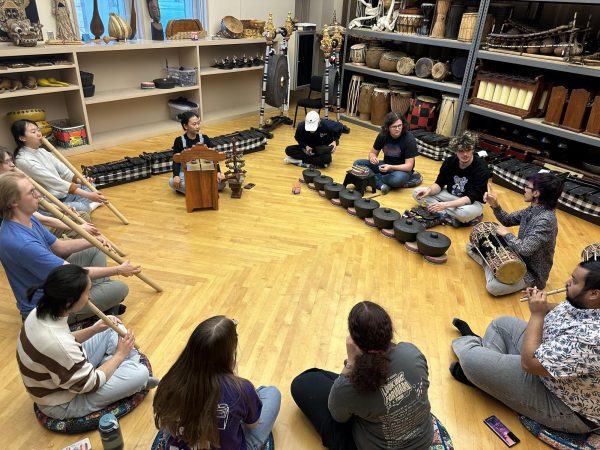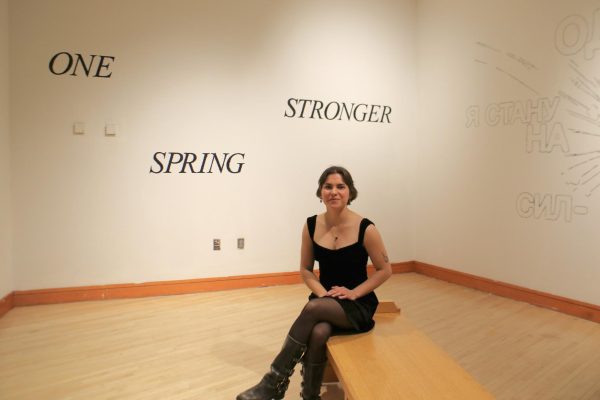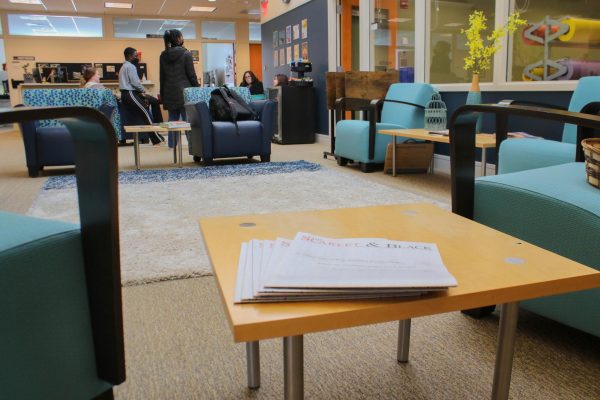CEQ: Off-campus living and community perspective
February 13, 2023
While Grinnell College presents the new Civic Engagement Quad (CEQ) in downtown Grinnell as “a gateway that fuses and dissolves the barriers between town and institution,” according to the College’s website, students and Grinnell residents vary in their opinions on the impact the CEQ will have on off-campus housing and creating coherence between students and residents in town.
Changes to off-campus residency
The CEQ will focus on single dorm rooms and apartment-style residencies, according to Dennis Perkins, assistant dean of residence life and student conduct. The dormitory, also named Renfrow Hall after Edith Renfrow Smith `37, will house 110 students. While many of these new spots will go towards reducing the forced triples and doubles in dorms on campus, the added dormitory may also create changes to who can access off-campus residency.
Each year, the department of residence life approves approximately 225 students to live off campus, Perkins said.
“We want to allow those 225 students off campus, and we only want them to be seniors,” Perkins said.
Perkins added that the number of available beds in each dormitory on campus continues to fluctuate as the College renovates residence halls. Norris Hall, which was renovated during the fall 2022 semester, reduced the number of available beds from around 121 to 110. A similar renovation to Main Hall, expected to begin after the construction of the CEQ is completed, will also cause the number of available beds to fluctuate.
“It should be just seniors who go off campus,” Perkins said. “But that’s not the reality. What we’re seeing is the number is coming in well under 200 in terms of seniors, so then we have to go to our third-year class. We don’t want to do that necessarily, but we do have to meet that cap to allow space for our incoming first years.”
The way I see it is that I should be able to live off campus if I really want to, but there is something that’s integral to the college experience about dorm life.
— Nicholas Lampietti `25
Lampietti, who will be abroad his entire third year, said he appreciates both options of living in the CEQ and off campus by the time he enters his fourth year, but that he currently anticipates living completely off campus.
“If I was going to be here next year, I would really want to live off campus,” he said. “But, in terms of whether it’s a bad idea that the third years will not be allowed to live off campus, I don’t know.”
Outside perspectives to the Civic Engagement Quad
According to a November 2020 survey of 376 students, faculty, staff and community members, 77% of respondents answered, “Yes” to the question “Do you think that more intentional connections between the College and the Town could be beneficial?” The survey, run jointly by Adjaye Associates and OPN Architects, has been the only city-wide survey to assess the public opinions of the CEQ.
Sarah Smith, director of outreach programming and events at the College, wrote in an email to the S&B that the College has been dedicated to ensuring that input and feedback for the project has been not just received from residents affiliated with the College, but across all sectors of town through focus groups, online meetings and personal outreach.
Smith did not respond to further requests for comment as to the frequency these focus groups meet, makeup of these focus groups or what constitutes “personal outreach” on behalf of the College.
The dormitory, to be located at the corner of Broad Street and 7th Avenue, will open the ground floor of the building’s south tower to both dormitory residents and all community members. One side of the dormitory will be restricted by Pioneer One-Card access due to safety concerns for students, according to Perkins.
Smith said the types of events, activities and spaces in this area of the CEQ will be determined based on both the 2020 survey and public input as the building nears completion. Venues for eating and drinking, performances and flexible meeting spaces in this first-floor common area received 40%, 35% and 31% approval from respondents in the November 2020 survey, respectively.
“There was a great deal of interest in indoor green spaces for gathering,” Smith wrote. “People think this will be especially attractive during cold Iowa winters and hot Iowa summers.”
Focus groups of students, faculty, staff and other Grinnell residents have continued to be held in order to receive feedback about the dormitory and shape the mission of the CEQ as the building moves closer to its completion target of fall 2024, according to Smith. Construction of the CEQ began in October of 2022 following a vote of approval for the project by the Grinnell College Board of Trustees on Oct. 1.
Chance Winburn, 26 and a lifelong Grinnell resident, said that he thinks the plot of land that the CEQ will be built upon should be left for businesses or city buildings that can be fully utilized by all residents, rather than a dormitory mostly utilized by students.
“I feel like this building is invasive to the downtown business district,” Winburn said. “It should be occupied for small businesses.”
Meanwhile, Grinnell resident David Menninga, 44, said that he thinks the CEQ will be great for Grinnell.
“I think it will hopefully bring more support to our local businesses as well,” he said. He said McNally’s Foods, for example, which will be located adjacent to the CEQ, has been a staple in Grinnell since he was a child.
Menninga said the only concerns he has heard have been from other businesses, often regarding downtown parking.
“I’m hoping that they have the underground parking just to accommodate the other businesses downtown and maintain parking for other customers,” Menninga said.
Smith did not respond to requests for comment about the availability of parking for the CEQ.
Laurie Kramer, 61, said that though she does not know much about the CEQ, she thinks the dormitory will help bring the students and the community together.
“I would just hope that students have the perception that we as a community want to see them… We want them to come out, we want them to be a part of what is involved within our community.”
— Laurie Kramer, Grinnell resident
“It will put the students right downtown, which will be helpful,” Kramer said. “But, I don’t see a lot of students out in the community, as a big group or as a whole. It does concern me that we would have that downtown dormitory and they [the students] may not come out within the community.”
Kramer added that since she does not subscribe to Grinnell’s newspaper, the Grinnell Herald-Register, she does not know how to access updates about the CEQ, and she wishes the College would provide more information online.








































































